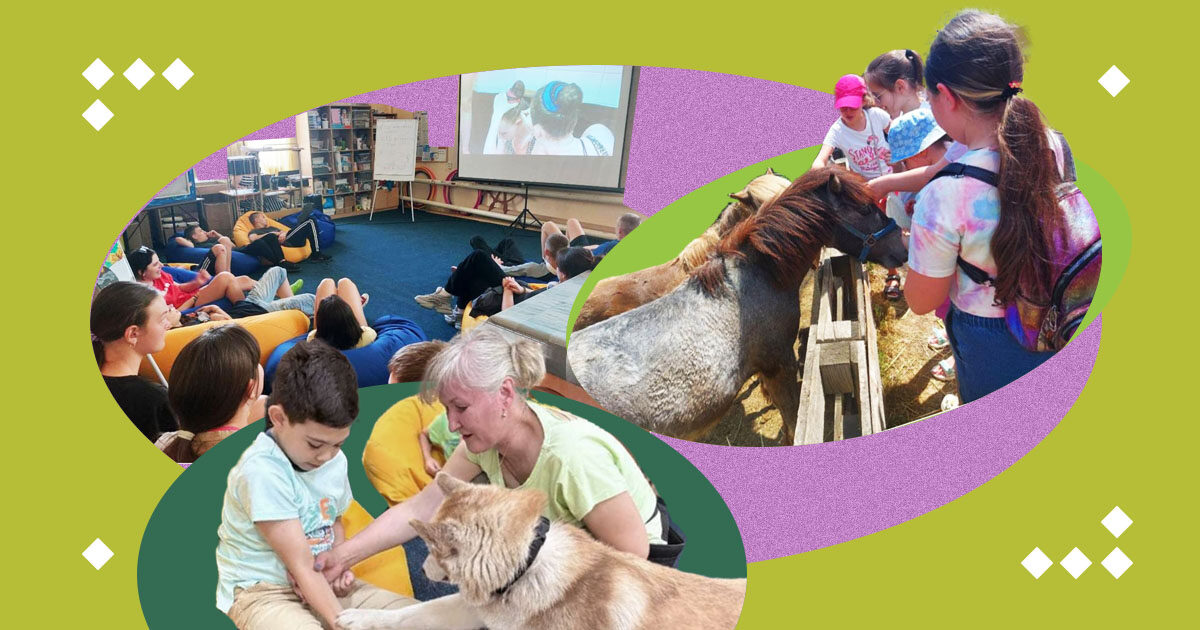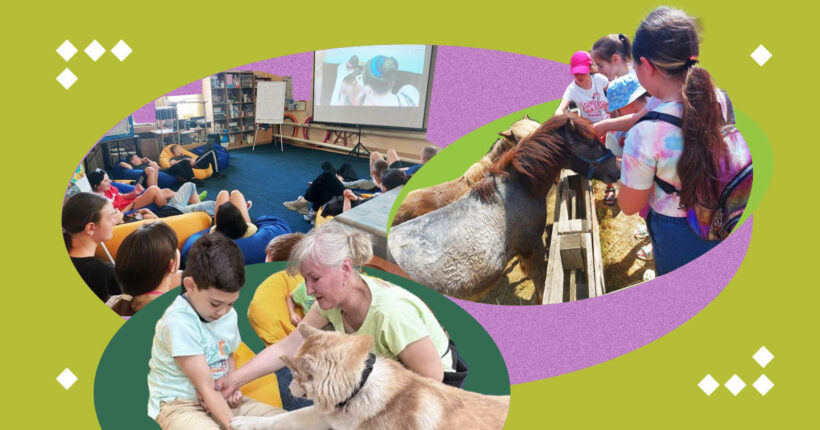
What is the problem?
Since the beginning of Russia's full-scale invasion in February 2022, the city of Kropyvnytskyi in central Ukraine has become a humanitarian center that hosts IDPs from the east and south of Ukraine. As of 2024, about 8,000 internally displaced young people aged 14 to 35 reside in the territory of the Kropyvnytskyi urban territorial community.
Displaced children and youth need decent and accessible psychological and socio-emotional support. This support should significantly help them develop and socialize. "This is especially relevant for families who do not have the opportunities and funds to receive paid services," says Olena Arutunian, head of the Happy Children project.
What is the solution?
The Happy Children project was created to help children and adolescents better adapt emotionally and socially to the changes caused by war. In particular, within the framework of the project, teachers and psychologists of Kropyvnytskyi implement the "Express Emotions" emotional stability training program.
While creating the program, the team developed interesting offers for children and teenagers. This includes art therapy, animal therapy, psychological and socio-emotional support classes, and movie club meetings with viewing of thematic documentaries. Arutunian and like-minded people are sure that all this will help stabilize the emotions and psyches of children and contribute to their inclusion in life in a new city.
Access to all classes of the Happy Children project is free of charge.
How does it work?
"Everything may look fine, but we are all scratched by the war"
Arutunian emphasizes that children and young people need the ability to manage their emotions and establish communication more than ever.
Children, who have been living under constant stress due to the war for over two years years, sometimes do not even realize that they need help. They often cannot find a common language with their peers and experience misunderstandings between parents and children, resulting in conflicts. These misunderstandings and conflict situations spill over into educational institutions and society. So, Happy Children's team undertook the task of finding new interesting approaches to help these children and their families.
First of all, Happy Children is a set of activities for children. Embarking on a kind of "Express of Emotions" journey, children develop physical and emotional abilities, learn to work in a team, overcome difficulties, and expand their worldview. All this is playful and fun, aiming to increase children's self-confidence. The project organizes acting classes, with the help of which children "practice" emotions and see them in action, share feelings, and learn to recognize and understand them. Another activity is making up stories, where children show their creativity and imagination. Creativity and art therapy are some of the main tools commonly used to work with children.
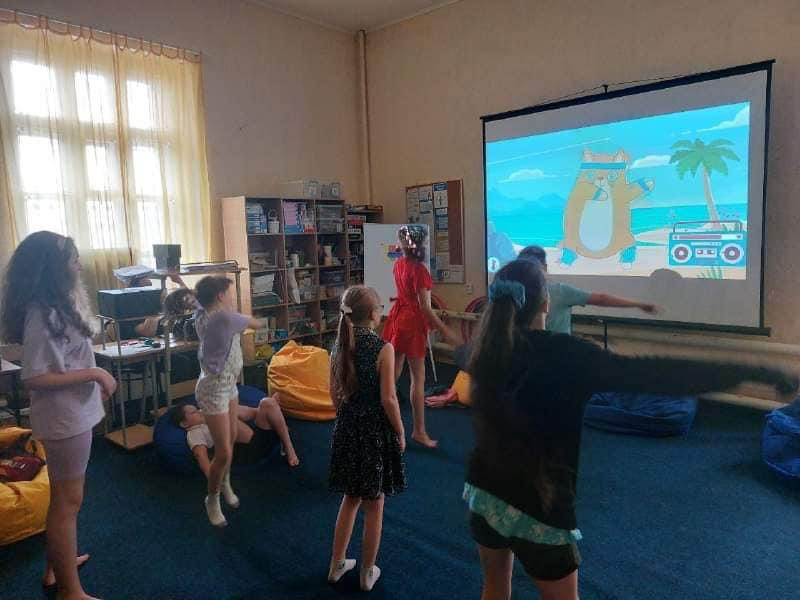
Tourist activities are also one of the Happy Children project's areas of work. During these activities, children learn teamwork and travel skills. Photo from the project archive
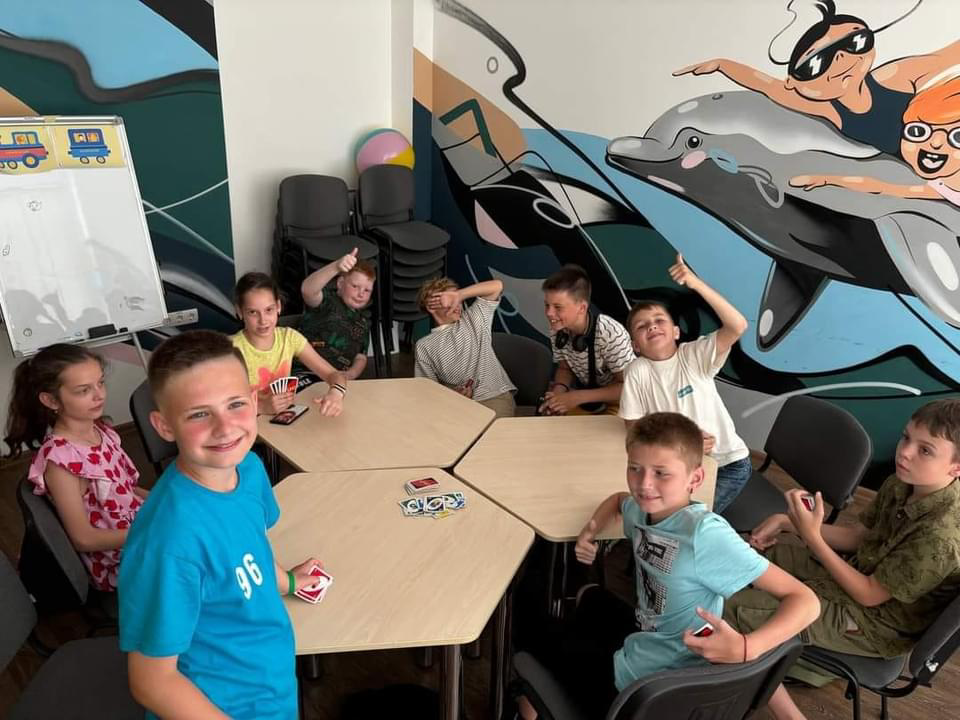
One of the activities organized by Happy Children is playing UNO cards. Photo from the project archive.
Nataliia Reznichenko, the project's mentor, psychologist, and expert in psychological support, shares that each child with whom they work in the project has unique talents and abilities and expresses joy, anger, fear, or sadness in their own way. Understanding these features revealed in the project's classes helps specialists better interpret the child's behavior and individual needs for support. Some children need more emotional support, while others need more space for independence.
Communicating with animals is beneficial for mental health
Children can also attend animal therapy classes free of charge within the project.
"Meetings and communication with animals are aimed at helping children overcome trauma, stress, and anxiety, as well as at developing their emotional stability and creative potential," explains Alyona Pavlovska, a practical psychologist, art therapist, and crisis psychology consultant.
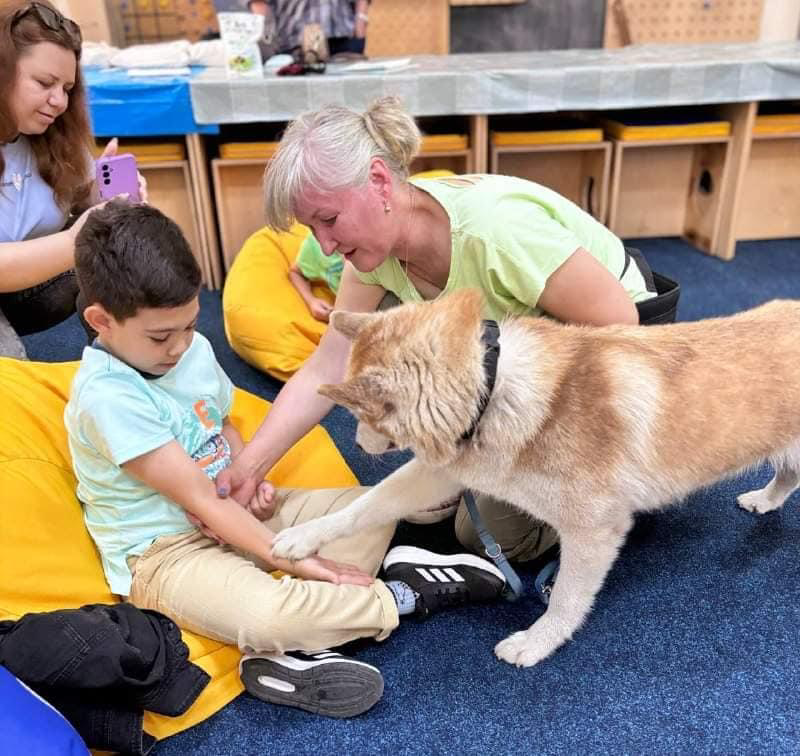
Happy Children: animal therapy brings joy to children. Photo from the project archive.
The animal therapy coach visited the children with her faithful assistant, the dog Katyusya. The specialist shared the secrets of properly communicating with these four-legged friends and told the children about the husky breed from which Katyusya comes.
In turn, the children could not only pet and play with the furry guest but also learn to better understand dogs' needs and emotions.
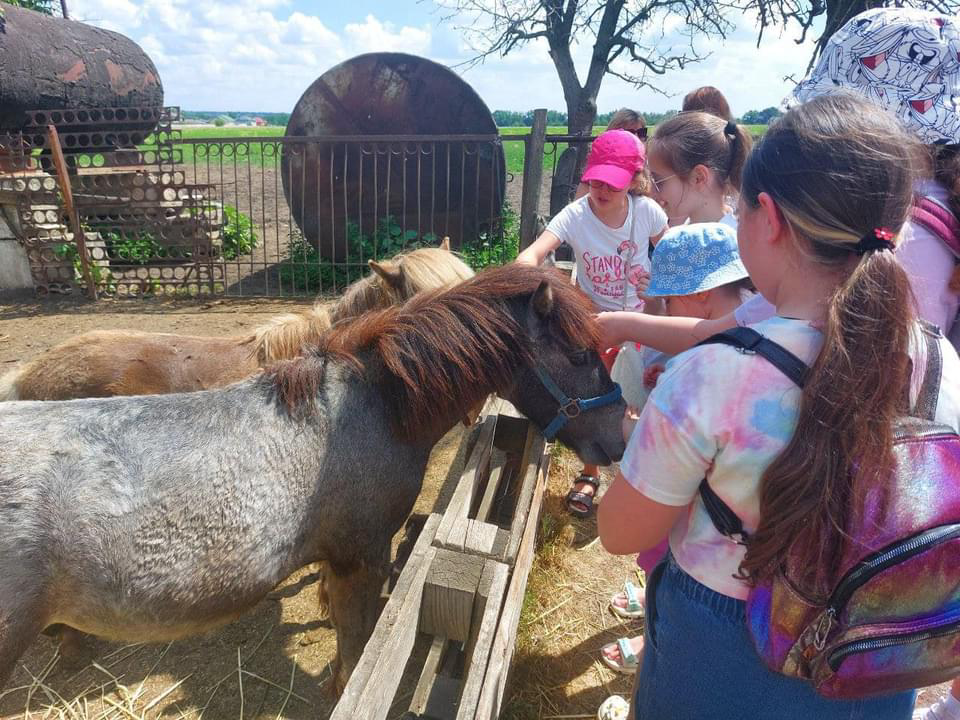
Equine-assisted therapy. Photo from the project archive.
For equine-assisted therapy, the project's young participants went to the Knyazhyi Dvir equestrian sports complex, where they were met by certified animal therapy trainers. According to Pavlovska, the project psychologist, the children's eyes "sparked with happiness" when they met the magnificent horses, stroked their fur, and fed them treats.
"For many children and young people who suffered from the war and experienced difficult life circumstances, equine-assisted therapy became a real salvation. It allows them to distract themselves from problems, feel happy and useful, and believe in a better future," says the psychologist.
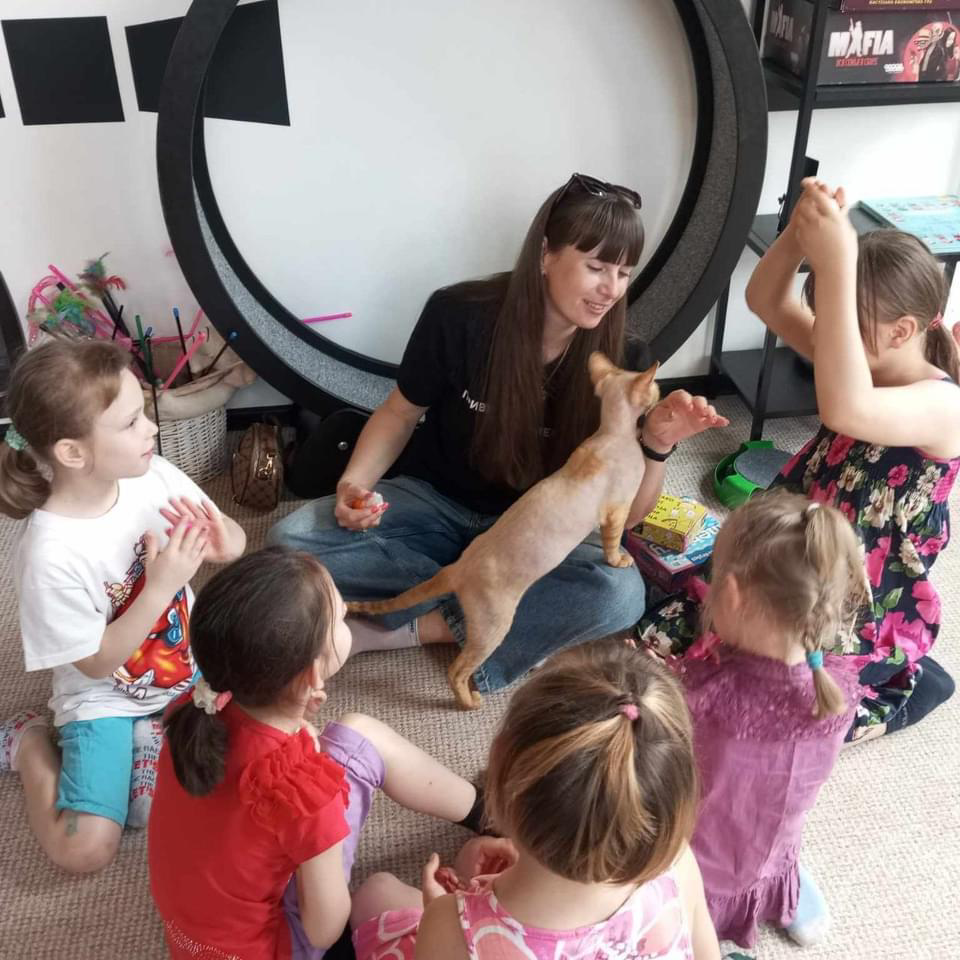
A visit to the Cat Cafe in Kropyvnytskyi. Photo from the project archive
Felinotherapy, or communication between a person and a cat, includes various methods: observation, games, tactile contact, paw massage, and others. It has been proven that stroking a cat normalizes the heart rate and blood pressure and creates a state of mental comfort. That is why therapy sessions in Cat Cafe are one of the project's activities.
There are practically no contraindications to this method of treatment, and in case of allergy to cat fur, there are short-haired and hairless breeds of cats. Therefore, children's visits to the coffee shop are always filled with positive emotions. Children play with cats, pet them, and simply enjoy their presence.
The cat cafe employees say the cats themselves are happy about such visits, so they are always pleased to receive young visitors.
"Cats who live in the cafe do not feel burdened. On the contrary, some meet people personally at the reception when they are interested. When the attention is too much, they have free access to their room with cat beds and food, where people cannot enter," comments Olena Kuzminska, the owner of the coffee shop.
"If you have a dream, desire, and perseverance, you will grow even through asphalt"
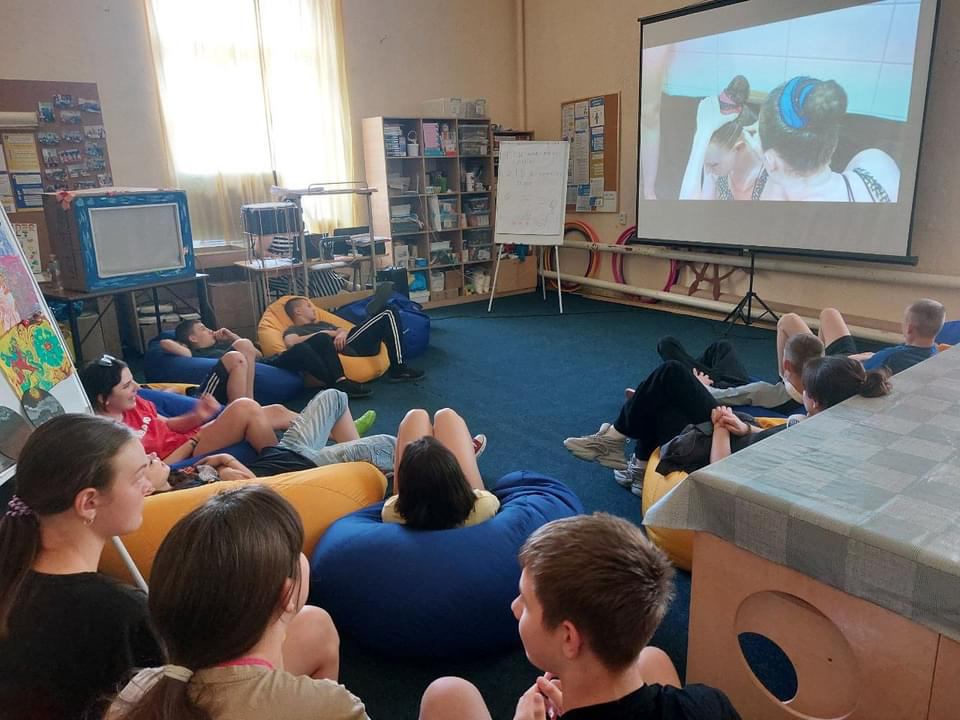
Children watching the movie "Giovanni and the Water Ballet" by film director Astrid Bussink. Photo from the project archive
Watching documentaries followed by discussing children's rights is another area of psychological support in the project. Convincing stories of real people who were able to achieve their goals show children the power of dreams and perseverance.
For example, the movie "Giovanni and the Water Ballet" is about a ten-year-old boy from the Netherlands who dreams of joining the synchronized swimming team. Faced with gender stereotypes and social barriers, he does not give up and becomes the first boy to participate in the Dutch Championship in this sport, which is traditionally considered female.
"Giovanni's story can inspire and motivate children and young people. This film proves that nothing is impossible; you can achieve all your goals and plans if you set them correctly, "shares Aratunian, who is also a mentor of the Docudays UA film club in Kropyvnytskyi. The movie shows how important it is to have the support of loved ones — Giovanni's friend Kim sincerely believes in him, and the coach helps to develop his talent. After the screening, the children discuss all this after the movies. They not only talk about their plans and dreams and what can help them realize their forces: if everything worked out for the film's hero, an ordinary, non-fictional boy, then why can't it work out for us? "These are very thorough and meaningful meetings," shares the Docudays UA film club mentor.
Does it really work?
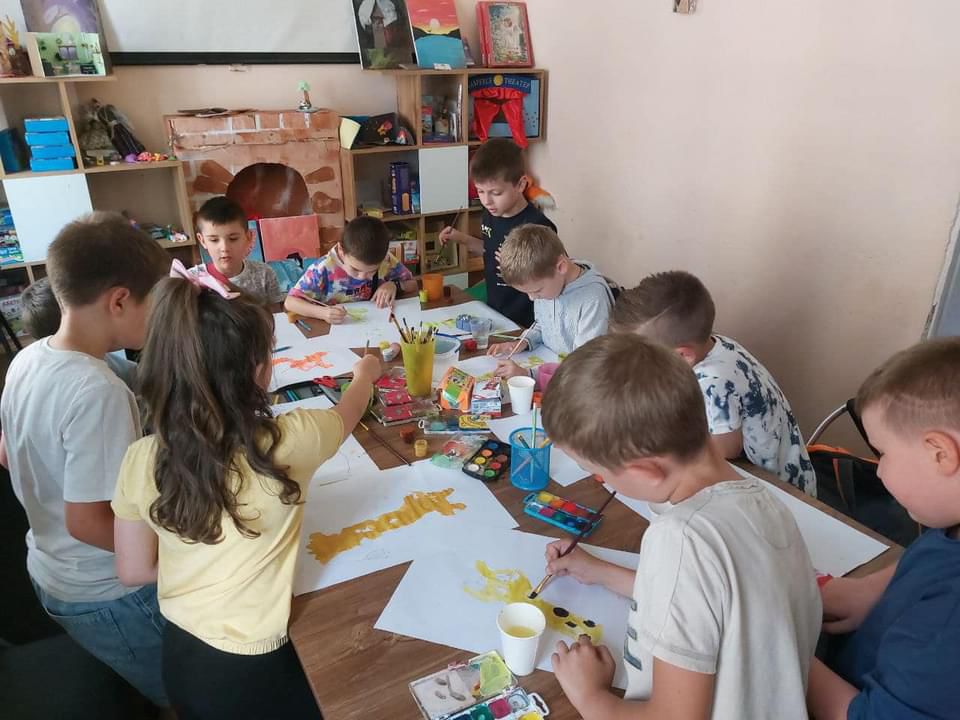
Art therapy helps children relieve stress, improve their mood, and feel happier. Photo from the project archive
The Happy Children project reached more than 80 children and teenagers within a month of its work.
Kuzminska sums up: "I strongly believe that during the time children spend with us, they are distracted from the everyday realities of war and other irritants."


